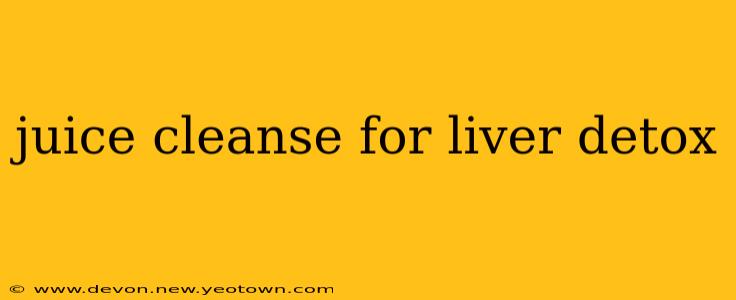The idea of a juice cleanse for liver detox has taken the internet by storm. We've all seen the vibrant photos of colorful juices promising a revitalized body and a sparkling clean liver. But does the science back up the hype? Let's dive into the world of liver health and juice cleanses to separate fact from fiction.
My journey into the world of health and wellness started years ago, fueled by personal experiences and a deep curiosity about how our bodies function. I’ve spent countless hours researching nutrition, and today I’m excited to share my insights on the effectiveness—and potential pitfalls—of juice cleanses for liver detox.
What is a Juice Cleanse, Anyway?
A juice cleanse, simply put, is a short-term diet where you replace solid food with fruit and vegetable juices. Proponents claim these cleanses help flush out toxins, improve digestion, and boost energy levels, particularly focusing on the liver's detoxifying abilities. Many believe these cleanses promote weight loss, but that's often a temporary effect due to fluid loss, not actual fat reduction.
Does the Liver Need a "Cleanse"?
This is where things get interesting. Your liver is an incredible organ, a powerhouse of detoxification. It constantly filters your blood, removing toxins naturally. It doesn't need a "cleanse" in the way many juice cleanse advocates suggest. Think of it like this: your liver is already a highly efficient detoxifying machine—it doesn't need a forced reboot.
What are the Benefits of Drinking Fruit and Vegetable Juices?
While a full-blown juice cleanse might not be necessary, there are benefits to incorporating fruit and vegetable juices into a balanced diet. Juices can be a convenient way to get a concentrated dose of vitamins, minerals, and antioxidants. However, it's crucial to remember that whole fruits and vegetables are always preferable due to their fiber content, which aids digestion and overall health.
Can Juice Cleanses Harm Your Liver?
While not directly harming your liver, juice cleanses can have unintended consequences. The sudden lack of fiber can cause digestive upset, including constipation or diarrhea. Also, the high sugar content in many fruit juices can lead to blood sugar spikes and crashes, impacting energy levels and potentially contributing to other health issues.
What are Some Healthy Ways to Support Liver Health?
Instead of resorting to potentially disruptive juice cleanses, consider these proven methods for supporting liver health:
- Eat a Balanced Diet: Focus on whole, unprocessed foods, including plenty of fruits, vegetables, and lean protein.
- Stay Hydrated: Drinking plenty of water is essential for flushing out toxins.
- Maintain a Healthy Weight: Obesity puts extra strain on the liver.
- Limit Alcohol Consumption: Excessive alcohol consumption damages the liver.
- Avoid Exposure to Toxins: Minimize exposure to environmental toxins where possible.
Are There Specific Juices That are Better for Liver Health?
Some juices contain nutrients that support liver function, such as beetroot juice (rich in nitrates), or juices with high antioxidant levels, like those from berries and leafy greens. However, relying solely on juice for these benefits is not recommended; a balanced diet provides a much broader range of nutrients.
What are the Risks of Juice Cleanses?
Aside from the potential for digestive issues and blood sugar imbalances, some individuals might experience nutrient deficiencies due to the restrictive nature of a cleanse. If you have pre-existing health conditions, consult your doctor before starting any juice cleanse or major dietary change.
Conclusion: Prioritize a Healthy Lifestyle
Ultimately, supporting your liver health is about adopting a holistic approach to wellness. Instead of chasing quick fixes like juice cleanses, focus on long-term lifestyle changes that nourish your body and support your liver's natural detoxification processes. A balanced diet, regular exercise, and mindful choices are far more effective than any short-term fad diet. Remember, consulting a healthcare professional or registered dietitian is always recommended before making significant dietary changes.

